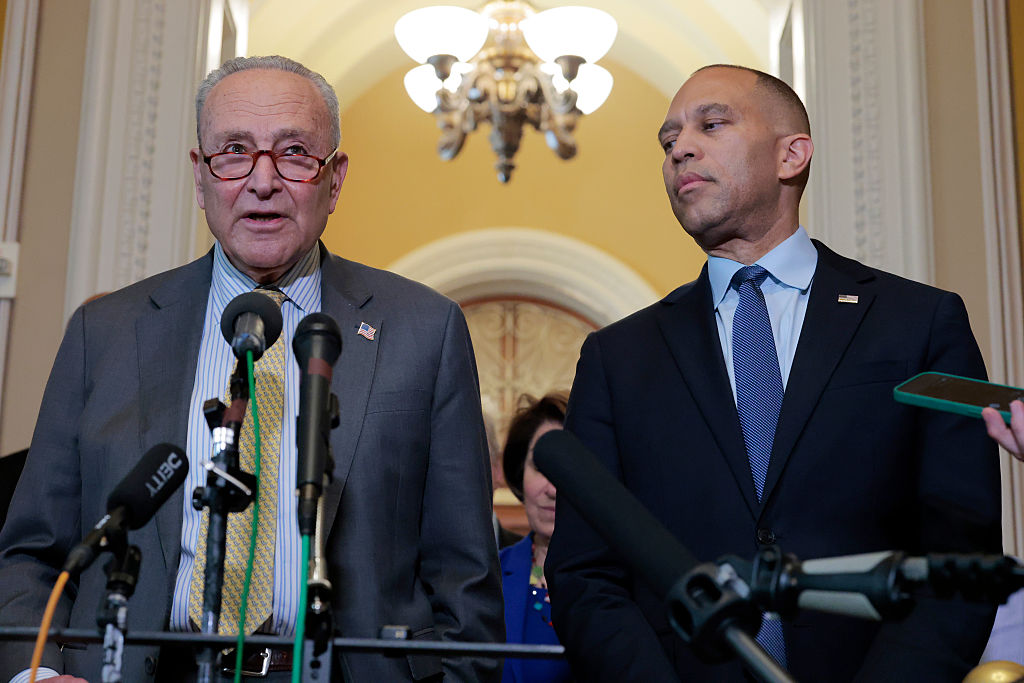With just over 24 hours before the government is set to shutdown, President Donald Trump and congressional leaders from both parties emerged from a high-stakes White House meeting on Monday with no agreement, setting the stage for large swaths of the federal government to close after midnight Wednesday.
[time-brightcove not-tgx=”true”]
The impasse came after closed-door talks between the four top congressional leaders and Trump in the Oval Office, where lawmakers appeared to trade blame but make little progress towards a deal. “There are still large differences between us,” Senate Minority Leader Chuck Schumer told reporters after the meeting, claiming that Republicans refused to engage on their core demands around health care and restoring previous funding cuts.
“Their bill has not one iota of Democratic input,” he added, taking aim at a House-passed seven-week stopgap funding bill that Senate Democrats rejected last week. “That is never how we’ve done this before.”
Leading up to the meeting, Republicans cast doubt on the prospects for a deal and insisted that Democrats support their measure to extend federal funding at current levels through Nov. 21 and provide $88 million in added security for top government officials. But Democrats have continued to assert that their votes—which are needed to clear the Senate’s 60-vote threshold—are contingent on the bill including key health care provisions, particularly a permanent extension of enhanced Affordable Care Act tax credits that have helped millions of middle-class families afford coverage. Without action, those subsidies will expire at year’s end, raising premiums just as Americans begin signing up for 2026 plans in November.
Democrats also want to reverse $1 trillion in cuts to Medicaid that Republicans enacted unilaterally this summer, eliminate new work requirements for that program, block the White House from clawing back funds previously approved by Congress, and restore funding for medical research.
The meeting, held just one day before the Sept. 30 funding deadline, marked Trump’s first with top Democratic leaders since his inauguration in January. It was also the first time Trump spoke with Schumer and House Democratic Leader Hakeem Jeffries about government funding.
Republicans argue that Democrats are making unreasonable demands on a stopgap bill that historically has served as a narrow, short-term bridge. “They had some ideas that I thought were reasonable, and they had some ideas that the President thought was reasonable,” Vice President J.D. Vance told reporters after the meeting. He insisted that Republican leaders would “love” to work with Democrats on health care policy in the future—but that those talks should happen only after the government is kept open and essential services are funded.
“We are not going to support a partisan Republican spending bill that continues to gut the health care of everyday Americans—period, full stop,” House Democratic Leader Hakeem Jeffries said as he left the meeting. “There’s a Republican-caused health care crisis that is causing hospitals and nursing homes and community based health clinics all across the country, in rural America, urban America, small town America, the heartland of America, and black and brown communities throughout this country, and that crisis is happening right now, and that’s why we believe there is urgency to both keeping the government open, reaching a bipartisan spending agreement that actually meets the needs of the American people in terms of their health, their safety, their economic, well-being and quality of life, while also addressing the dangerous Republican health care crisis.”
The deadlock leaves the government barreling toward its first shutdown in nearly seven years. If no agreement is reached, hundreds of thousands of federal employees will be furloughed starting early Wednesday morning, while others deemed essential—such as air traffic controllers, Border Patrol agents and military service members—will be required to work without pay. Unlike in past shutdowns, the Trump Administration has threatened not only temporary furloughs but permanent job cuts in agencies overseeing environmental regulation, agriculture, and labor.

